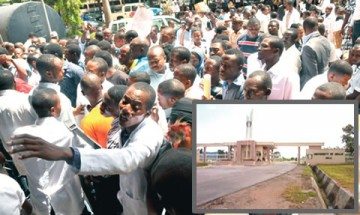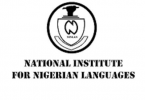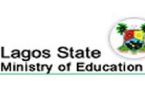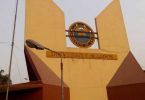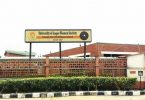Following the suspension of three programmes at the University of Abuja by the Federal Government, JOHN ALECHENU who visited the institution, reports that it may need more than six months to retool academic facilities for the affected programmes
The decision by the Federal Government to suspend three professional programmes run by the University of Abuja, Abuja about four weeks ago, took many, especially students of the affected programmes – medicine, veterinary medicine and engineering by surprise.
The affected students numbering about 500 took to the streets to protest the abrupt end to their programmes, in which some have spent close to eight years for a five-year programme without a hint on their graduation date.
Minister of Education, Prof. Ruqayyatu Rufai, while announcing the decision to suspend the programmes, noted that they were run without the requisite accreditation by the National Universities Commission.
She also pointed out that the affected programmes lacked accreditation by professional regulatory bodies such as the Medical and Dental Council of Nigeria, Veterinary Council of Nigeria and the Council for the Regulation of Engineering in Nigeria.
Rufai said, “It is on record that the university had continued to offer these programmes against the NUC directive on their stoppage. Consequently, we are now in a situation where students who were admitted into these programmes spent so many years without a graduation date.
“The ministry has initiated the process of strengthening the governance structure of the university to ensure compliance and effective programme development.”
As expected, the decision set off a chain of events leading to calls by the institution’s chapter of the Academic Staff Union of Universities on the Universities Governing Council to remove the Vice-Chancellor, Prof. Sunday Adelabu.
The Dr. Clement Chup-led UniAbuja chapter of ASUU passed a “vote of no confidence” in Adelabu over his perceived inaction and incompetence in running the affairs of the institution. These, they alleged, led to the suspension of the programmes.
ASUU accused Adelabu of running the university like a personal estate. It said, “ Adelabu was appointed in July 2009 as VC to succeed Yaqoub. Since his assumption of duty, he has embarked on an exercise of annihilation-the destruction of academic culture, staff morale, deviation from statutory method of administration, running the university like a personal estate, under-developing academic programmes, (and) virtual erosion of academic activities, all of which have culminated into an unprecedented state of decay in the university.
“ASUU has consistently raised these issues which have been corroborated by the NEEDS Committee reported widely by the media.
“On the allegation of corruption against the VC which he found difficult to defend, ASUU’s position is clear and has been catalogued in the past and officially presented to a council committee. In addition, a Federal Government White Paper on the Visitation Panel has equally vindicated ASUU.”
While admitting the VC inherited the three faculties which were recently suspended, the ASUU chapter said the university management had no excuse not to build on the foundation laid by its predecessor.
The call itself has polarised the union as a faction of ASUU under the aegis of Integrity Group, described the members Chup-led ASSU as products of a pre-conceived agenda targeted at the VC.
The pro-Adelabu faction led by Dr. Ya’u Damagun and Dr. Peter Maidoki, denounced the Chup-led group. It held a parallel meeting and issued a communiqué in which it said the university’s image was under threat.
The faction however argued that, “the reasonable thing to do is to work with the VC as a means of resolving all issues affecting the institution rather than exacerbate the situation as being done by some members of staff.”
It accused the Chup-led group of working “consistently to disrupt the peace, tranquillity and academic culture of the university.”
The group also said, “As far as the current situation is concerned, everything is on track to set the university on the road to attaining full accreditation for all its academic programmes.
“At the moment, the NUC is working with the university, according to the Minister of Education’s directive on how to resolve the problems.”
It claimed that the vice-chancellor had taken steps to address the issues at stake, with the Senate commending his efforts. In view of this, it said that it considers “any attempt to undermine the progress made so far as sabotage to the efforts of all stakeholders to develop the university.”
Keen observers of events at the university are of the opinion that the government’s big stick was long in coming. The general state of affairs at the university had been a source of worry, not only to parents but to regulatory authorities, staff as well as students.
Two weeks before the three faculties were suspended, a team sent to assess the needs of public universities in line with the FG/ASUU 2009 agreement set the tone for events which followed.
Leader of the team and Executive Secretary, Tertiary Education Trust Fund, Dr. Mahmood Yakubu, expressed shock at the lack of basic teaching and learning facilities especially in the sciences faculty.
Of particular concern to the committee was the fate of the students studying in the affected faculties.
The committee discovered that about 100 students of Veterinary Medicine were been taught by 45 lecturers who have been doing so without a functional laboratory for the practical aspect of the courses.
The faculty of veterinary medicine also does not even have a Veterinary Clinic much less of a hospital for clinical students.
Yakub said, “Part of the problem over a long period of time is complete absence of planning. Programmes were established without accreditation by anybody, they have students that cannot graduate as you have seen here and probably elsewhere.
“We have looked at the infrastructure here and the learning resources, there is something that we need to do and government is committed, that is why government is saying there will not be additional money committed unless and until we know precisely what we are funding.’’
Earlier, the committee was informed that the Veterinary Council of Nigeria which is the regulatory body charged with accrediting such programme insisted that a laboratory was an irreducible pre-requisite for the programme.
This situation, according to the Dean of the Faculty, Prof. Tunde Ajagunna, was responsible for the non-graduation of students. Some of the students have been forced to spend eight years for a programme which ordinarily should run for five years.
He further explained that there were currently three batches of students in the Faculty waiting to graduate.
The story was more pathetic at the Faculty of Engineering where 10 students were allowed to graduate without the approval of the NUC and COREN.
Although, as a result of the lack of accreditation for the faculty, the school said it stopped admitting students for the programme two years ago. It has 400 students and 35 lecturers.
National President of ASUU, Prof. Ukachukwu Awuzie, who was also part of the team said, “The University of Abuja by my own belief is supposed to be the epitome, the best in this country because of its strategic location.
“Unfortunately, it is not attaining that level because of poor planning and again the underfunding we have always emphasised.
“We have seen the agony of our children, who have stayed here for several years and cannot graduate.
“If all the facilities were there, there is no way they won’t graduate and even the environment under which they are taught, you can be sure that it cannot produce world-class engineers, or world-class veterinary doctors or world-class medical doctors and these are some of the professions you cannot toy with.
“In summary, it’s not our expectation but we are not surprised. This is the fate of most of our universities. Some of you have not gone round to see that we are now using plastics as seats in some of our universities.”
On his part, the embattled VC has requested for and has received a six- month grace to put things in order for accreditation. He had told anyone who cares to listen that his firm stance against the corruption and admission racketeering earned him powerful enemies within and outside the university.
According to him, those who were “making and sharing money from admissions and our Distance Learning Programme” were fighting against their loss of revenue which was made at the expense of the school. These people, he noted, would stop at nothing to run him down.
Officials of the Federal Ministry of Education and some university insiders are skeptical about the workability of the six months deadline obtained by the VC.
An official, who pleaded for anonymity noted that, “Some of the facilities we are talking about are not things you go to Wuse Market to buy. You have to order for the right equipment and convince COREN, Veterinary Council and the Medical and Dental Council of Nigeria to accredit them; I don’t see that happening within six months-honestly.”


